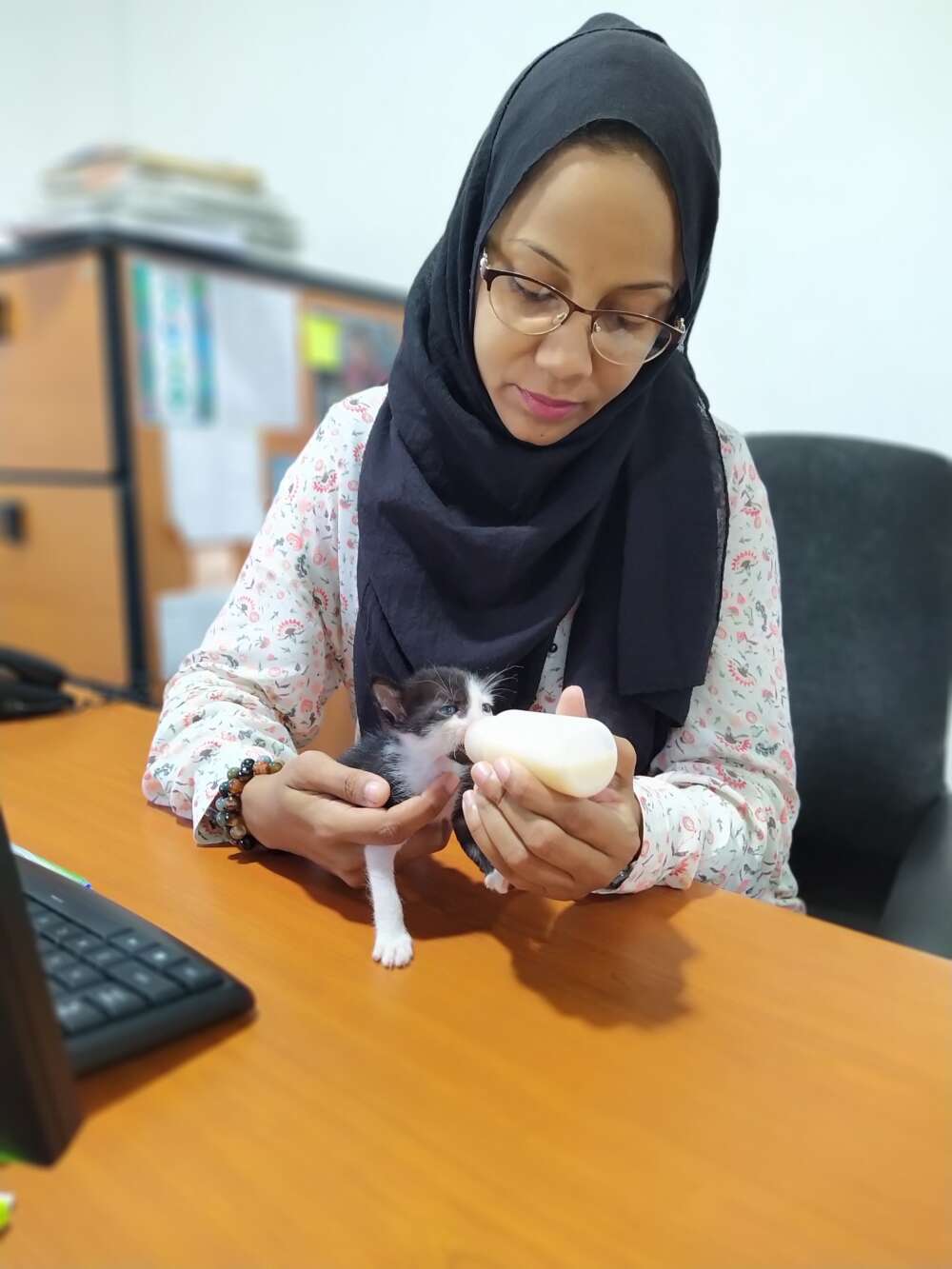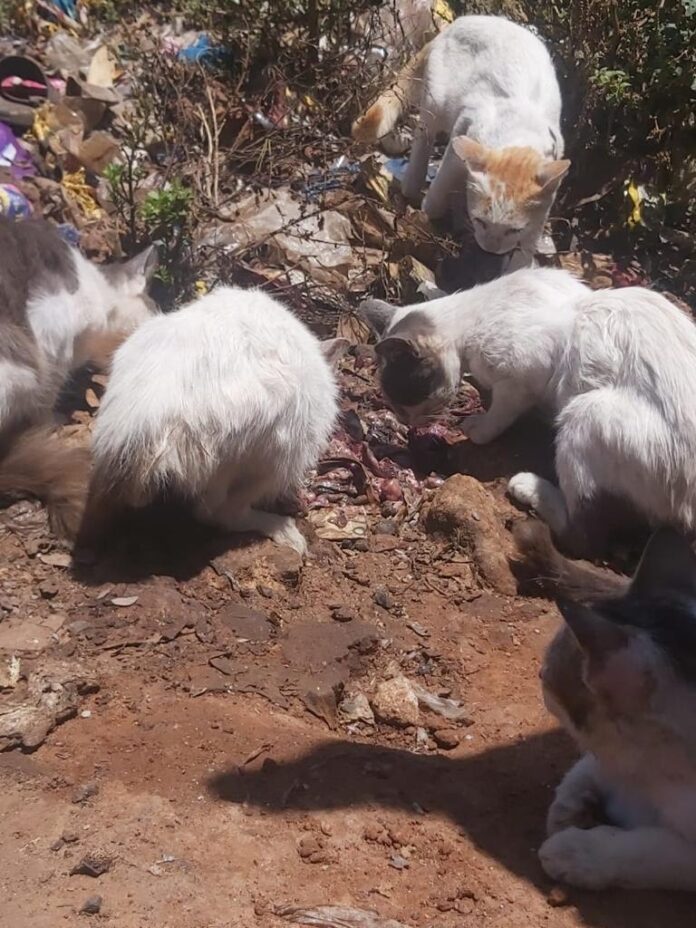By Shani Fakii, Devreporter, Mombasa County

In summary
- The superstition around cats in Mombasa is that they are wicked people (jinni) with several tales to that effect.
- First-time visitors to Mombasa are usually warned about beating or pointing a finger at a cat due to the superstitious beliefs.
There has been a long history of stray cats and dogs in Mombasa County. The presence of these cats in the streets is a menace to various businesses, and at times, to school-going children. The cats are often associated with superstition.
The Superstitious Myth
The superstitious belief around stray cats in the county is that they are wicked people (jinni) with several tales to that effect. Therefore, first-time visitors to Mombasa are usually warned about beating a cat in the streets or pointing a finger at it.
Citizen TV in 2013 aired a story about a cat whose head that got stuck in a twenty-litre jerrican of water in Kiembeni, Bamburi. The news about the happening spread rapidly with most people believing that it was a witch who was returning from a home after a night operation. The residents were not willing to rescue it because of superstitious beliefs.
Mombasa residents and even visitors to the county have heard these tales and are linked to sorcery, where witches allegedly turn felines into human incarnates to terrorise the residents. Locals claim that sometimes the cats scare people by producing funny noises like the cries of babies and adults.
However, most of the Mombasa residents are of the view that increasing number of stray cats in the area arise from pet owners whose financial challenges make it difficult for them to maintaining the cats, hence they roam freely in the streets.
A Likoni businessman, Mr. John Charo, laments: “Stray cats in Likoni, Maweni, area have been a disturbance, especially at night. They jump on top of the houses making weird noises like an infant crying, awakening tenants who have to chase them away.’’
Mr. Charo, says that the owners of these cats are to blame for not feeding them for days. He posed; “Why keep pets if you cannot provide food and shelter for them”?
Animal Cruelty and Abuse
According to a report from the Kenya Society for the Protection & Care of Animals (KSPCA), 2022, a serious stray cat problem has existed in Mombasa for a while and the society has been doing a lot in its attempt to rescue them.
Mr. Mwachiko Abdallah from Kisauni, led this Devreporter in a tour of a rocky football pitch in the area. Halfway through the walk, there was stray cat running for its dear life as a lady was shouting and hurling stones at it.
Mr. Mwachiko had to interrupt the woman to find out why she was shouting at the cat. The furious lady explained that the cat had attempted to eat food stored in her kitchen.
“It was about to snatch the food that I kept in the kitchen. I was lucky I got there on time,” the lady answered as her neighbours laughed loudly.
During the interview, Mr. Mwachiko explained that some cats and dogs were wandering in the streets because, while at their owners’ homes, they had developed certain offensive behaviours like stealing food or pooping on sofa sets, and the owners angrily kicked them out and this is how they ended up in the streets.
Mr. Mwachiko added that there is “an increase in animal abuse and mistreatment cases at the Coast. Puppies are often being thrown away covered in plastic bags to die. Most have died due to intense bone fracture beyond repair because of beatings.”
But there are misconceptions, according to some of the residents, that cats are witches, so they deserve to be stoned and killed.
Rescue Shelter and Rehoming Pets

As the animals struggle to survive and the authorities unable to adequately address the problem, Mrs. Nusrat Mohammed, a Mombasa resident, stepped in to rescue the animals by providing them with shelter and food.
Mombasa residents now call her Do-little “mama paka.” Even when little children in the neighbourhood rescue cats, they rush them to Mrs. Mohammed for rehoming.
Mrs. Mohammed, who was born and bred in Mombasa County, spent most of her teenage years in Kisauni Mwandoni. She started rescuing stray cats and dogs when she was only seven years old.
“Growing up in such a community as a Muslim woman, being seen with pets especially dogs, “unaambiwa ni uchafu” (you are told it is dirty), and that I should not bring diseases to the house. Animal compassion welfare was not a reality then,” Mrs. Mohammed narrated.
But now people in the area have gotten used to Mrs. Mohammad’s efforts.
She said that while growing up, she always wanted to be a vet because of her compassion for animals. She added that she was forced to change her dream career.
Today, the mother to four kids and who has worked in the tourism sector for ten years says that she still has the same passion, and is now applying it to rescuing stray cats and dogs.
Mrs. Mohammed says that she decided to engage in rescuing animals to demystify the longstanding animal cruelty in the area and champion their rights. She says she has so far managed to change the misconception of the community towards pets.
Alongside few like-minded people, she founded Pwani Animal Welfare (PAW) where pets in distress can be taken once rescued.
“The primary focus of this community-based organisation is to create awareness and compassion towards animals. Animals have feelings and we need to understand that and care for them. However, there is a need for the government to introduce community vet clinics for those in the low-income households, which will also create awareness on communicable diseases caused by animals, such as ringworms, rabies, among others,” she explained.
The Animal Welfare and Protection Bill 2019 explicitly recognises all animals, not only vertebrates, as sentient beings. Moreover, the Bill mandates stunning of animals before slaughter. It further requires all animals used for experiments to be anesthetised.
Under part V, the Bill also states the following about ownership, duty to care and protect an animal by persons in charge: a person who owns an animal is responsible for, or custodian of any animal shall provide the animal with adequate water, food, healthcare, and space and ensure the animal is not subjected to fear, pain, stress or any form of suffering.
As she progressed with her organisation, Mrs. Mohammed decided to come up with a niche. She believed it would not be sustainable to take cats from the streets and bring them home.
“How many cats will I rescue? KSPCA has been there for ages and still has not managed to remove all cats from the streets,” she said.
Through PAW, Mrs. Mohammed says that she has managed to change the mind-set of the community in the area. Together with the department of veterinary in Mombasa County Veterinary and the Kenya Veterinary Association (KVA) coast branch, they have been offering free rabies vaccination within Mombasa Island, which was not common before.
Mrs. Mohammed has rescued over 800 cats since she started her work. While some have survived, others have died due to serious injuries.
“I rescue neonates sometimes thrown in the streets still with umbilical cord and they die after a few days,” she said.
Kenya’s constitution, which was promulgated in 2010, covers the rights of both domestic and wild animals. Chapter 5 Part 2 (Environment and Natural Resources) of the constitution obligates the state to protect biodiversity.
The Fourth Schedule of the constitution outlines the roles of the two levels of government – national and county – in promoting animal welfare in the country. The national government is responsible for the protection of wild animals in the conservation areas while the county governments are mandated to see the welfare of domestic animals including livestock and pets.
Parliament passed the Prevention of Cruelty to Animals Act (2012), which was a revised version of the earlier law that was passed in 1983. The new law is broader and aims to control how animals are handled, including when they are being used for experiment purposes.
Other related stories:
Pwani Animal Welfare-Kenya builds safe living quarters for cats & dogs (animal-kind.org)
https://www.coopsandcages.com.au/blog/natural-instincts-cats






